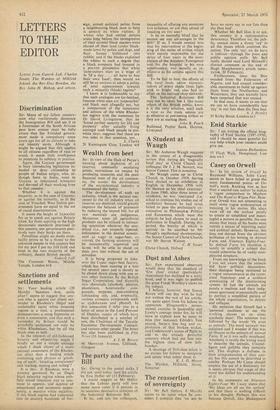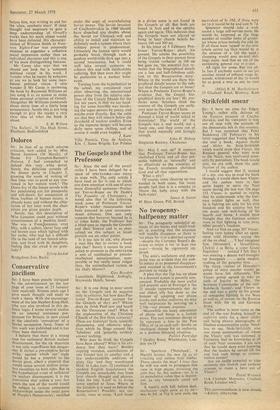Casey on Orwell
Sir: In his review of Orwell by Raymond Williams, John Casey seems to have failed to grasp the most fundamental points of Or- well's work. Ranking him as less than a second-rate author he makes a vague comparison to Mayhew and The Road to Wigan Pier. How- ever Orwell was not attempting to instil some vague undercurrent of meaning in his stories. His ideas were all on the surface purely to create as simplified and mean- ingful a picture as possible. No one denies that many of his books were merely a means of reporting social and political defects. However, this does not detract from the obvious brilliance of his writing in Animal Farm and Nineteen Eighty-Four. In Animal Farm his intention is surely to simplify a subject that would otherwise be of vastly com- plicated structure.
From my knowledge of the book I was not aware that the animals did have political discussions, their dialogue being restricted to a vague remonstrance at the tyran- nical Napoleon and a confined questioning of the deteriorating system. In fact the animals are purely a medium and their indig- enous ignorance is successfully used to portray a simplified picture of the whole organisation, its defects and collapse.
He mentions that Orwell had a 'personal readiness to see the working classes as an alien, apathetic mass'. The sentence was followed by the words 'Or even as animals'. The word 'animals' was italicised and I wonder if this was an illusion to the animals of Animal Farm. If so it was sadly misplaced. Apathetic is surely the wrong word to describe the animals. Unintel- ligent and gullible they certainly arc. This displays a dullness in their comprehension of their soci- ety but this cannot be described as apathy. Perhaps Mr Casey should employ the use of a dictionary for it seems obvious that usage of this word has dulled his understanding of it.
In his comments on Nineteen Eighty-Four Mr Casey states that 'His ideas are all on the surface' and that there is nothing difficult in his thought. Perhaps this was because Onvell, like Shakespeare before him, was writing to and for the 'alien, apathetic mass'. If deep -thought was necessary to gain a deep understanding of Orwell's works then his main object would have been defeated, His character- isation of Winston Smith in Nine- teen Eighty-Four was purposely minimal to engender a reflective social impression rather than an individual character and this is one of his main distinguishing features.
Mr Casey also says that we should not look for a 'coherent Political vision' in his work. I wonder what he means by coherent or are we to look for some inco- herent political vision. I also wonder if Mr Casey is reviewing the book by Raymond Williams or Just using it as an excuse to make some personal criticism of Orwell. Altogether Mr Williams commands about thirty lines of a fairly long commentary. Surely this is not long enough to give the reader a very clear idea of what the book is about.
S. H. Wilson 'The Rafters', 70 The .High Street, Blunham, Bedfordshire











































 Previous page
Previous page